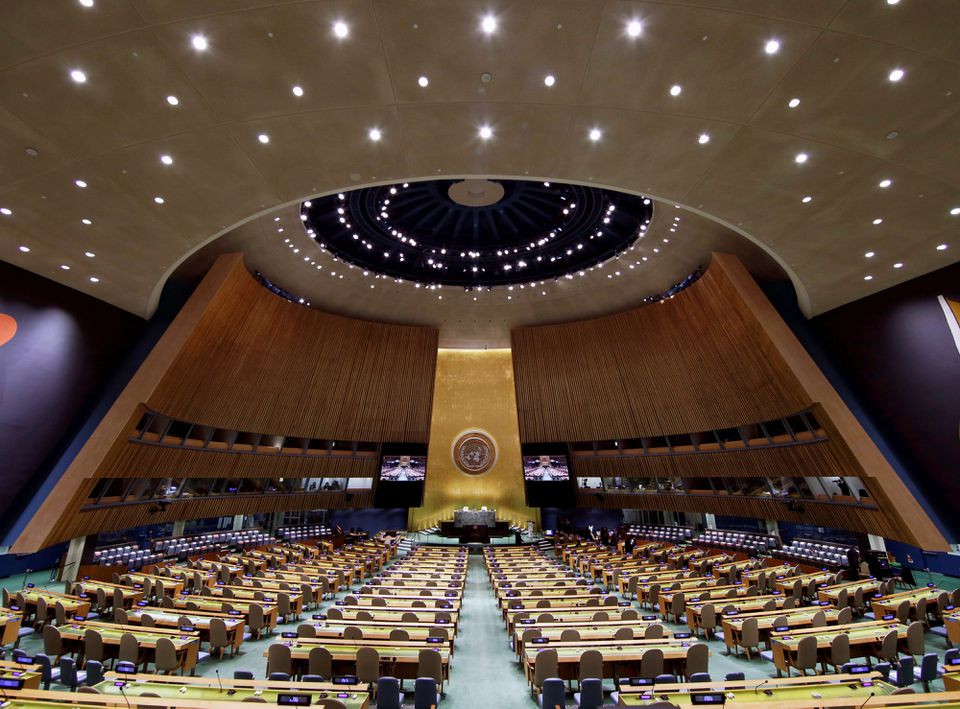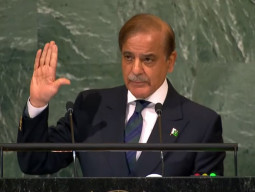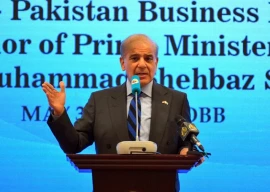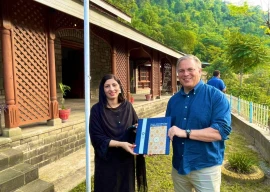
The United Nations General Assembly (UNGA) adopted a resolution on Friday, urging the world to scale up its humanitarian assistance to support rehabilitation and reconstruction in Pakistan devastated by climate-induced monsoon rains and floods.
The resolution, passed by consensus in the 193-member body, said that better access to international climate financing was important to help developing countries mitigate and adapt to climate change, particularly those that were the most vulnerable.
The Pakistan-sponsored resolution was co-sponsored by 159 countries from all regions of the world. UNGA President Csaba Korosi said that he stood with Pakistan in this critical hour of need, and urged the international community to help the flood-devastated country.
The UNGA was informed that floods in Pakistan had claimed some 1,700 lives, destroyed or damaged 2 million homes and left one-third of the country submerged in fetid, stagnant water.
The resolution called on the international community to boost humanitarian assistance for the rehabilitation efforts.
“Countries, like Pakistan, which confront such climate-induced disasters should not be left to fend for themselves, dependent on the generosity and charity of friends,” Ambassador Munir Akram, Pakistan’s Permanent Representative to the UN, said, while introducing the resolution.
The resolution stressed the need for continued cooperation between the Pakistani government and the relevant organisations throughout the ongoing relief operations and rehabilitation and reconstruction efforts in a manner that enhanced resilience and reduced vulnerability to future natural hazards.
Under the terms of the resolution, the UNGA called for full support and assistance to the government of Pakistan in its efforts to mitigate the adverse impacts of the floods and to meet the medium- and long-term rehabilitation and reconstruction needs.
The resolution also called on the international community to “scale up its humanitarian assistance and rehabilitation of Pakistan, in order to repair and strengthen the country’s prospects for achieving sustainable development”.
Through the resolution, the UNGA also encouraged “the member states, the United Nations and humanitarian organisations to continue working together to address the different needs of the affected populations, particularly the most vulnerable”.
The resolution requested UN Secretary-General Antonio Guterres and the UN system entities to continue to support Pakistan in the preparation of a climate-resilient reconstruction plan, responding to national priorities and development needs.
In his speech, Ambassador Akram drew attention of the member states towards the havoc wrought by the raging floodwaters. “The total estimated damage caused by this calamity is $32 billion, 10% of Pakistan’s GDP,” the Pakistani envoy said.
“The World Bank estimates that as a direct consequence of the floods, the national poverty rate may increase by 4.5 to 7.0 percentage points, pushing between 9.9 to 15.4 million people into poverty and intensifying the depth and severity of poverty for already poor households,” he added.
“We must construct mechanisms that can enable climate-struck countries to access resources to mitigate the impacts of the ever more frequent and more intense climate disasters and to recover quickly from such disasters.”
The envoy paid tributes to Guterres for his timely visit to Pakistan to personally convey his solidarity and issue call for assistance. He said that Guterres had touched the hearts of the Pakistani people. “If a referendum was held in Pakistan, the secretary-general would receive, not 99%, but 100% support!”
The floods in Pakistan killed over 1,700 people and injured 13,000 others.
Besides 33 million people, including 16 million children, are estimated to be affected by heavy rainfall. Over a million homes, 13,000 kilometres of national highways, 410 bridges and 5.4 million acre crops are damaged.
The floods have also displaced at least 7.9 million people, of whom some 600,000 are living in relief camps. Nearly 800,000 refugees are estimated to be hosted in more than 40 calamity-notified districts, including over 175,600 women, 194,000 girls and 206,000 boys.
“The people of Pakistan are the victims of a grim calculus of climate injustice,” Secretary-General Guterres said in a passionate speech, adding that Pakistan was responsible for less than 1% of global greenhouse gas emissions, yet it was paying a “supersized price” for man-made climate change.
The UN chief vividly described what he saw in the flood-devastated Pakistan: “A level of climate carnage beyond imagination: flood waters covering a landmass three times the total area of my own country, Portugal. Many have lost everything – their homes, their livestock, their crops, their futures.”
Guterres added that “when I visited Pakistan, I saw the best of humanity”. He said that he saw the immense generosity and solidarity of neighbours and strangers helping one another and the people who put themselves at risk and lost all their worldly possessions to rescue others.
“But I also saw the future we might face. Today, it is Pakistan. Tomorrow, it could be your country and your communities. Climate chaos is knocking on everyone’s door, right now. We must step up and answer the call for the people of Pakistan. This global crisis demands global solidarity and a global response.”
Guterres particularly warned of a public health disaster emerging in Pakistan, saying that the risk of a diseases outbreak threatened to claim far more lives than the floods. “Nearly 1,500 health facilities have been devastated, greatly hindering the ability to detect and respond to outbreaks,” the UN chief added.
Rich countries’ unkept promise to provide $100 billion a year in climate change financing, starting in 2020, is a recurring sticking point in international talks on global warming. In a speech to the UNGA, Guterres said that UN climate talks, known as COP27, in Egypt in November “must be the place for serious action.”
Agencies



1723032398-0/BeFunky-collage-(36)1723032398-0-165x106.webp)
1730516134-0/Diddy--Lopez-(1)1730516134-0-165x106.webp)

1730541652-0/£300,000-(3)1730541652-0.png)


1730538097-0/£300,000-(2)1730538097-0.png)
1730531553-0/Express-Tribune--(1)1730531553-0-270x192.webp)










COMMENTS (1)
Comments are moderated and generally will be posted if they are on-topic and not abusive.
For more information, please see our Comments FAQ